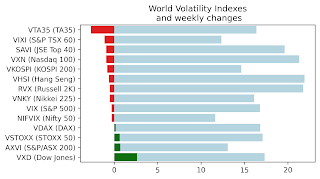Since CBOE launched VIX Index, it proved to be immensely popular measure of overall stock market risk. The popularity however was somewhat tempered - there is no way to trade VIX directly. Over the years there was some progress and financial innovation.
In 1993 Michael Webber, a trader from UBS structured a variance swap contract on FTSE index. Variance swap is a contract which payoff is proportional to volatility squared. Variance swaps became a very popular OTC instrument, but it was not quite the same as volatility, and people wanted to trade volatility like they saw it on the news, or calculated on spreadsheets. Variance was easier to structure, but did not have quite the same appeal.
In early 2000s two Goldman Sachs quants - Sandy Rattray and Devesh Shah decided to tackle the problem. They updated and re-formulated VIX formula, and coordinated with CBOE to launch futures in 2004. Futures on VIX index grew in popularity overtime and became the dominant market for volatility price discovery. I have to add, that I am not sure if reformulation of formula was necessary - or even beneficial. VIX liquidity seem to have grown quite organically, first in futures, then in options, and most recently in ETFs and ETNs ties to VIX futures.
However majority of investors and stock traders did not have quite the easy access to VIX. In the US futures accounts and stock accounts regulated by separate government agencies, typically require different account opening documents, may or may not be cross-margined, basically there is some friction. VIX was prominent in the news during the 2008 financial crisis, and this provided an opportunity for Barclays to launch the first VIX ETF in 2009.
VXX overall was quite disappointing for traders looking to hedge stock market risk. I am not going to review VXX decay, as it has been explained adequately, just point out that for many people it did not work like VIX index, and it did not work like VIX futures, and it created a lot of frustration.
Since then there were two (major) attempts to bring something like VIX to the market. Building on liquidity of weekly SPX options CBOE introduced VXST Index - 9-day VIX, and launched futures and options in 2014. Unfortunately the instruments did not attract liquidity and disappeared by the end of the year (if I remember correctly)
More interesting product came from Accushares with VXUP and VXDN ETFs. I am linking here to an excellent explanation from Vance Harwood. The (half-baked, imo) idea was to make corrective distributions
- dividend-like payments to bring NAV in line with the index, but since no reverse process existed, pricing pretty much fell completely out of line with the VIX, and the products were shortly delisted.
Now, I would like to bring attention to a different product in a different market - perpetual swaps on BTC, that afaik were first introduced at Bitmex, and now trade on Deribit and Cryptofacilities. Perpetual swap is actually a spot-like instrument, that pays "dividend" if swap midprice is below index, and requires "dividend payment" is swap midprice is above index. These payments insure that swap midprice does not stray far off the index.
Such instrument would be perfect for spot VIX instrument, however practically this seems impossible. Current financial regulation landscape makes it very difficult to introduce new instruments, and back-office infrastructure is mostly not equipped to handle two-directional payments.
The reason why crypto-exchanges succeeded with perpetual swaps is because their infrastructure was build from ground-up not 20 or 10 years ago, but within the last few years, without legacy requirements, on modern systems, with immediate trade and settlement capabilities. Traditional exchanges simply cannot do that. On the other hand, crypto-exchanges cannot trade VIX perpetual swap because the index trademark, calculations, and data dissemination belong to S&P or licensed to CBOE or CME, and they would not be interested in some other exchange taking over their very lucrative VIX franchise.
So, I believe that VIX spot instrument is at an impasse at this time. Maybe this will change in the future, and investors will have an instrument that will be directly tied to the VIX index value.
Subscribe to:
Post Comments (Atom)
Weekly market report
Wall st delivered a mixed bag of news with VIX, VNKY, and VSTOXX and their underlying markets almost unchanged. VXD - volatility index based...

-
John “Hojun” Hwang is the author of VIX, VIX Futures, and VIX ETNs, a conceptual guide to trading the VIX index. He graduated with degrees i...
-
This week 's market movements were largely driven by renewed recession fears in the wake of a sharp rise in office v...
-
Wall st delivered a mixed bag of news with VIX, VNKY, and VSTOXX and their underlying markets almost unchanged. VXD - volatility index based...


No comments:
Post a Comment